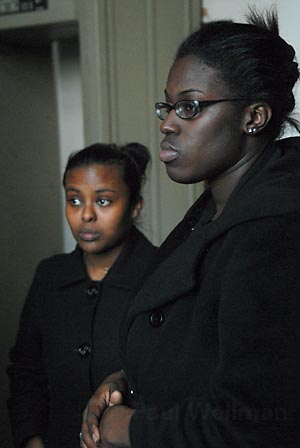Split Verdict in Cooney’s Case
One Defendant Found Guilty; Jury Hung on Second

A Santa Barbara Superior Court jury found Aseye Allah guilty of a misdemeanor of obstructing a police officer while at the same time was unable to reach a verdict for Meron Meshesha, who was facing the same charge. The charges stem from an incident outside of Cooney’s Nightclub (now EOS) in the early morning hours of June 16, 2006, when, as the club was letting out, a man was punched by another man. This, prosecutors said, incited the large crowd, which hurled insults at the officers and demanded they help the man on the ground. Meshesha, who testified she was helping the man who was punched and lying unconscious on the sidewalk, Reggie Smith, was arrested after running into and allegedly grabbing Officer Andre Feller‘s arm, Feller testified. Meshesha said she never heard Feller’s instructions to back away. Allah was arrested a few minutes later, when the emotional crowd was surging into a police line that had been formed. Allah testified she was trying to help clear the area and get her friends out. She testified that she heard orders to get back, but after being pushed down a couple of times, remained where she was to direct people out. While she may had been trying to help, which some jurors agreed she was trying to do, she wasn’t obeying orders by several officers to get back. Jurors said that because Allah admitted on the stand to have heard the orders, but did not back up and clear the area herself, they found her guilty.
After an almost four-week trial, the jury of eight men and four women began deliberating Tuesday afternoon, and word of a verdict in one count came at around 4:15 p.m. Thursday. All 12 jurors said they didn’t believe they would be able to reach a decision on the count. “We’ve discussed it extensively,” jury foreman Drew Wakefield told Judge Brian Hill before Hill read the verdict. “We’ve come to the agreement that no further discussion or evidence will help us come to a decision.” Jurors later said that 11 jurors were for convicting Meshesha with only one holding out, based heavily on the credibility of testimony of Feller, who arrested Meshesha.
After the verdict was read, tears could be seen on the faces of the two women, who had no comment after leaving the courtroom. Senior Deputy District Attorney Joyce Dudley sat in the courtroom for the verdict on the behalf of prosecutor Paula Waldman, who is on vacation until Tuesday. After relaying the verdict result to Waldman, she commented on Waldman’s behalf. “She appreciates the hard work the jury put into this,” Dudley said, noting the length of deliberation. Part of the reason the trial went so long is because she “wanted to give the jury all the facts.”
With 11 jurors convinced of Meshesha’s guilt as well, Dudley said there is a possibility Meshesha’s case could be retried, but “Paula has to assess that when she gets back.” Defense attorney Gary Casselman said he didn’t know if Meshesha would be retried, but “they’ve got more money than common sense,” in the district attorney’s office. Hill said it was unlikely Allah would face jail time with the penalty likely to be insignificant. Casselman, although he had yet to discuss the verdict with his clients, also indicated there were plans to appeal. He said the fact that a jury instruction related to when “lawful performance is an issue,” according to a state court information website, CALCRIM 2670, was left out of the jury instructions in this case, there is a strong base for an appeal. The jury instruction paragraph reads: “A peace officer is not lawfully performing his or her duties if he or she is (unlawfully arresting or detaining someone/ [or] using unreasonable or excessive force in his or her duties). Instruction 2670 explains (when an arrest or detention is unlawful/ [and] when force is unreasonable or excessive).]”
“The evidence of excessive force was overwhelming,” Casselman said. Hill, he explained, acknowledged that one of the most frequent reasons for reversals is faulty jury instructions. “We were deprived of defending what the law allows and requires,” Casselman said.
The verdict could have implications when it comes to a civil lawsuit the two women had filed in U.S. District Court last summer, naming 16 law enforcement officers from the Santa Barbara Police Department, as well as Chief Cam Sanchez and 10 unidentified defendants. The civil case has been dismissed pending the outcome of the misdemeanor trial. Casselman, who is also representing the women in the civil case, said he didn’t consider the dismissal a setback, as the suit hadn’t made its way very far down the line. The suit listed 18 complaints for damages, including allegations of suppression of free speech, a conspiracy to interfere with civil rights, battery, excessive force, negligence, and unlawful arrest. If the two are acquitted in the criminal case, it seems the civil suit would resume.
With Allah’s conviction, a judge might be more inclined to throw out the civil suit since the police actions were essentially found lawful and Allah was found to have been breaking the law. Case law seems to support this. In Heck v. Humphrey, the U.S. Supreme Court decided that civil action suggesting unlawful police acts leading to arrest and conviction is barred if the plaintiff was found convicted of the crime. While it was never brought up during the trial, the importance of the jury’s decision in terms of the civil case seems obvious. Representatives from the office of the city attorney, who would be representing the police officers in the civil case were present for the reading of the verdict and have been attending the trial on occasion.
Allah and Meshesha will be back in court February 6.



